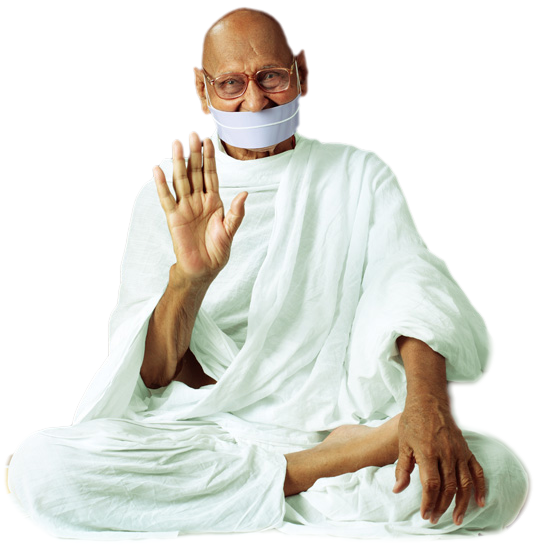The Essence of Ahimsa:- By Acharya Mahapragya
|
The Essence of Ahimsa
By Acharya Mahapragya
It is necessary to keep in mind four core subjects while considering Jainism. Jain canonical texts are divided into four parts on the basis of the same four-fold classifications: Dravyaanuyoga or philosophy The subject which influences society most is ethics. Philosophy forms its background. Human conduct and behavior are directly related to society. Lord Mahavira propounded Anuvrata, a code of conduct, for man as a social being. Non-violence occupies top position in that code. Mahavira laid down the principle that non-violence is the same as righteousness. Violence cannot be an instrument of religious merit. Mahavira proclaimed the compete unity of mankind. Racial or communal discrimination, hatred and unsociability constitute violence. There is no room for them in nonviolence. He emphasised the preciousness of all life, and the importance of minimizing harm of any kind. Mahavira pointed out three characteristics of Dharma or religious merit, viz. non-violence, restraint and penance. All the three are attributes of the individual and of his inner being. The individual character resulting from the practice of the above characteristics is truly moral. Non-violence means consciousness free from love and hate. It represents the spiritual aspect of Dharma. Its ethical aspect lies in non-indulgence in violence, refraining from falsehood, non-stealing, continence or chastely and non-possession. Consciousness free from love and hate is an individual self's characteristic. It is not oriented towards someone else and it is not related with anyone else. Not killing another sentient being is man's behavior towards some else. So, it is ethical. A moral law is the fruition of the spiritual form of righteousness or Dharma. Since it originates in the spiritual form of Dharma, it is no different from Dharma. The basic technique of the social order is non-violence, and non-violence implies developing fearlessness and non-aggression. It is the law of the jungle which permits a tiger to devour other animals. It is the law of the ocean which permits a bigger fish devouring a smaller fish. Where there is fear, there is no society. For society fearlessness and non-aggression. Both these together constitute non-violence. Hence non-violence is a necessary condition for human civilisation. It is not a choice. A code for the step by step development of non-violence in a social being can be prescribed. Violence can be divided into three kinds: Arambhajaa, i.e. violence committed while pursuing agriculture, commerce and industrial activity as a means of living; virodhajaa, i.e. violence resorted to in order to defend oneself from aggression; and smakalpajaa, i.e. willful deliberate violence. For man as a social being it is not possible to avoid the first (aarambhajaa). As for virodhajaa violence, avoiding it, though not impossible is near impossible. Those embarking on the practice of non-violence should first of all give up willful violence (Samkalpajaa). Non-violence is an experiment in spirituality. It is useful for society as it is for awaking spiritual consciousness. Violence does not merely mean killing al living being; quarrelling and fighting are also violence. Criticizing, backbiting and condemning others are also forms of violence. Yet another form of violence is dishonesty in matters financial and commercial. They constitute smakalpajaa (willful) violence. They are all extremely harmful to a healthy society. The non-violence anuvrat (small or basic vow) propounded by Lord mahavira is very comprehensive. It is and experiment in building a healthy social order. Lord Mahavira has provided for a vow to restrain consumption (tapas) in order to reinforce non-violence and non-possession. Earning wealth can never remain untainted without this restraint the problem of morality cannot be solved. More than five hundred thousand men and women joined Lord Mahavira's vrati (disciplined by vow) society. Their spiritual life became highly developed. Simultaneously general social life was also transformed. Two thousand five hundred years after Mahavira have not even slightly reduced the importance of a vrati society, a society where people take the vow to limit consumption and practice non-violence. Any step taken in the above direction will open up new vistas to both individuals and society as a whole.
----------------------------------------------------- Acharya Mahapragya lives and preaches in India. He is the head of the Terapanthi Sect and a leading proponent of the Anuvrata Movement based in Ladnun, Rajsthan. ----------------------------------------------------- Mail to : Ahimsa Foundation |
|
